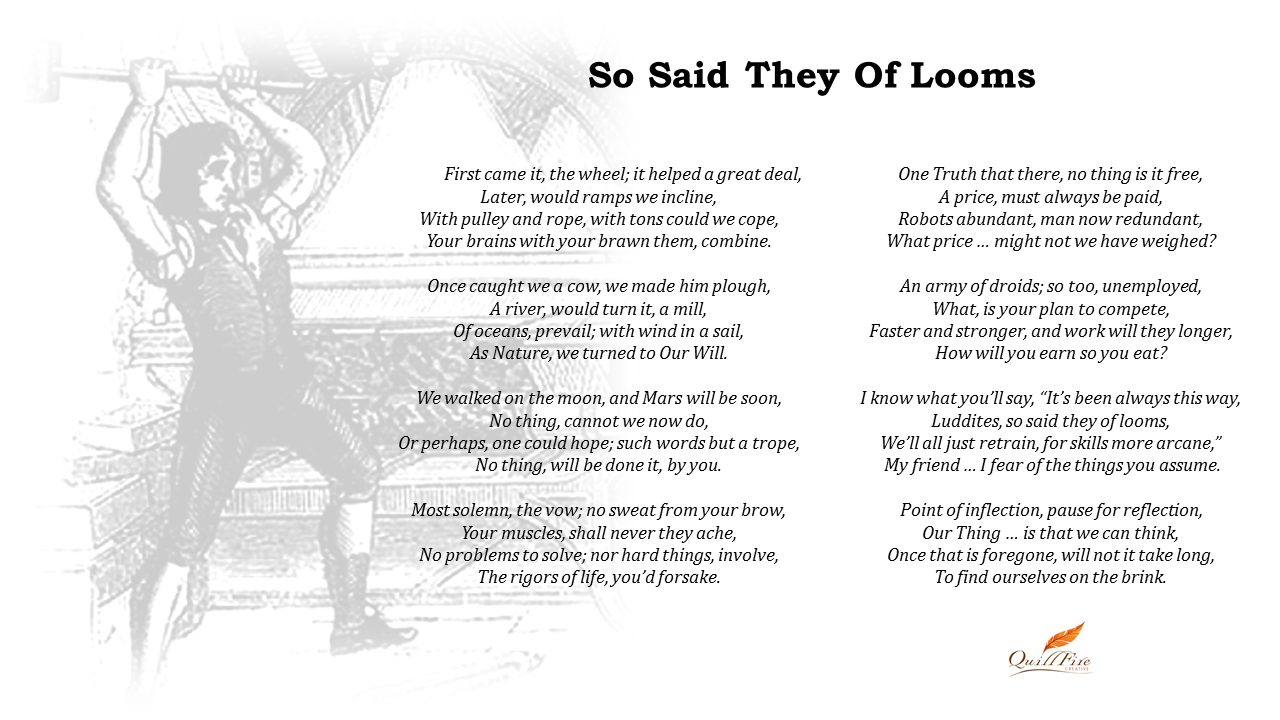

The debate about Artificial Intelligence (AI) remains a peripheral issue in our society. Politicians are not gaining or losing votes because of their views on the subject. Nor are activists organizing rallies or storming university administration offices over the issue. Sure, a few luminaries such as Elon Musk, Bill Gates and Stephen Hawkins periodically weigh in on the issue, but the shelf-life of their comments can be measured in days, if not hours. It is, at this point, a debate amongst nerds.
This will change.
Up to this point in time, advances in technology have been about creating tools designed to overcome inherent human weaknesses. Oxen, pulleys and cranes compensated for our limited physical strength. Planes, trains and automobiles dramatically increased our ability to quickly get from one place to another. Manufacturing robots operate 24/7 without the need to power-down for 2/3 of the workday (to eat and sleep), or completely on the weekends.
Each of these technological transformations caused large numbers of human beings to become obsolete. Thankfully, human beings are pretty good at adaptation – the ability to engage in new behavior in response to a changing environment. Often the transition process was rough for those who’d become redundant, but the gains in productivity were so large that a portion of such gains could be siphoned off through taxation to help pay for retraining programs. Humans were consistently pushed up the value-chain (into thinking occupations) and society, as a whole, benefited.
Such process works, albeit painfully, so long as there is some skill that the unemployed may acquire that will be in demand by future employers. But if 'strong-AI' becomes a reality, what skill could that conceivably be? Huge portions of the bread-and-butter work of attorneys and accountants has already been replaced by software programs. Legions of financial planners and real estate agents are, as we speak, being replaced by computer algorithms. The argument that this is a blue-collar problem and that the answer is simply ‘more education,’ is fallacious.
It takes years to learn how to write code (well) but, even today, computers can acquire the skill in the minutes it takes to download and install code-writing software. Even a quick perusal of Steemit posts reveals the flaws that remain in language-translation algorithms, necessitating the continued involvement of human translators when accuracy is required. But how much longer do you believe such deficiencies will persist?
The ability to think abstractly, to deduce meaning, to metaphorically extract the essence of one thing and creatively apply it to another … that’s the end of the rope. That’s the last thing that humans can do, that computers cannot. And that’s the very thing that AI research aims to accomplish.
The ramifications of such a development on individuals and society-at-large will be breathtaking. How will the masses earn an income to pay their mortgages and feed their families? Computers and robots are already faster and stronger than humans by orders of magnitude. ‘Thinking’ is all we’ve got left. There's nowhere left to go. The people sounding the alarm are not modern-day Luddites nor neo-Marxist hippies at Berkeley. They are some of the smartest, most successful and technologically-competent people on the planet.
Perhaps … we could all become poets on Steemit.
Poetry is one of the most inexplicable and ineffable of human abilities – we poets can explain neither how we do it, nor why. Surely, that’s safe. Right?
I’ll leave you with a computer-generated poem from Poem-Generator. It took me about thirty seconds to enter the inputs:
- Tone: Angry
- Gender: Male
- Singular Noun: Computer
- Two Adjectives: Thinking & Cunning
- Pen Name: Elon
and the (non-AI) computer about one second to write the poem.
The Thinking And Cunning Computer
- A Poem by Elon -
Whose computer is that? I think I know.
Its owner is quite angry though.
He was cross like a dark potato.
I watch him pace. I cry hello.
He gives his computer a shake,
And screams I've made a bad mistake.
The only other sound's the break,
Of distant waves and birds awake.
The computer is thinking, cunning and deep,
But he has promises to keep,
Tormented with nightmares he never sleeps.
Revenge is a promise a man should keep.
He rises from his cursed bed,
With thoughts of violence in his head,
A flash of rage and he sees red.
Without a pause I turned and fled.
“He was cross like a dark potato” ... ???
OK ... so I’ve still got a bit of time. Do you?

Did you: Up-Vote? Follow? Comment?
Perhaps you haven't read, "Ancient The Curse" in my Intro Post.
Don't think you're safe just because you're not a whale.
Don't screw around with Black Magic!
Poetry can make wonderful gifts
Visit QuillFire's Zazzle Store
